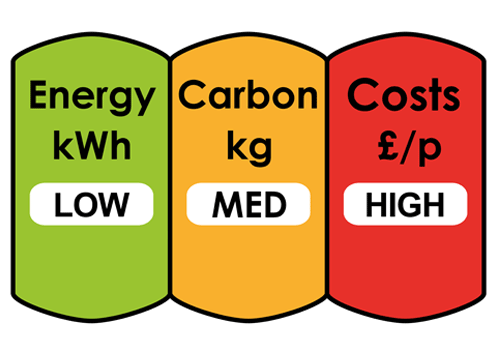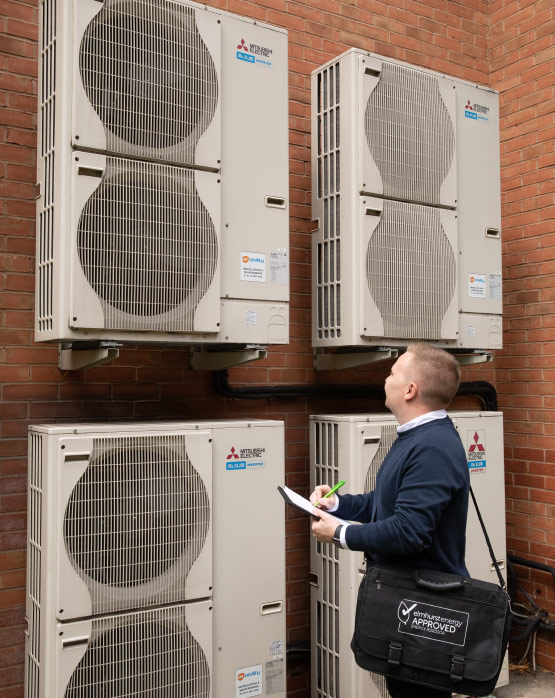What changes have been proposed for Non-Domestic Energy Certificates?
Last month, the government published the long-awaited consultation on EPC Reform, titled Reforms to the Energy Performance of Buildings regime. The consultation details a number of proposed changes to the EPB framework, including updates to non-domestic Energy Performance Certificates (EPCs), Display Energy Certificates (DECs) required for public buildings, and Air Conditioning Inspection Reports (ACIRs). Elmhurst has reviewed the consultation and has provided a summary of proposed changes which could impact these certificates.

Metrics
The consultation proposes the introduction of new complementary metrics for domestic EPCs. However, for Non-Domestic EPCs, it proposed that the single headline carbon metric is maintained – at least for the time being. As the consultation notes:
“Non-domestic EPCs are already carbon focused and are in line with our net zero objectives. As a consequence, we aim to maintain some consistency in the short term, particularly in light of any regulations which they underpin, such as minimum energy efficiency standards.”
Consideration for new primary or secondary metrics may occur in the future. The consultation seeks views on whether the new metrics proposed for domestic EPCs may also be suitable for non-domestic buildings in future.
EPC/DEC Validity Period
The government is considering reducing the EPC validity period from 10 years to encourage regular updates and ensure the data remains relevant. The government has presented 6 different options, ranging from less than 2 years to 10 years. Respondents are encouraged to provide rationale and any evidence to support each option chosen.
A reduction to validity period is also being proposed for DECs and DEC recommendation reports. For public building with a total floor area between 250-1,000m², the government is proposing that the validity period of both the DEC and DEC recommendation report be reduced from 10 to 7 years. Moreover, for public buildings with a total floor area over 1,000m², the government is proposing that the validity period of just the recommendation report be reduced from 7 to 5 years.
Air conditioning systems with an effective rated output exceeding 12kW must undergo inspection and have a new report generated at least every five years. The consultation does not propose any changes to this.
Compliance and enforcement
The consultation looks to improve compliance and enforcement of EPC requirements. As the consultation notes:
“Low compliance may be driven by the requirements being viewed as a ‘tick box’ exercise, rather than as something designed to aid building owners. This may be driven by limited awareness of the requirements, particularly EPCs for non-domestic properties and ACIRs.”
It is also noted that, in some instances, the penalties for non-compliance have not changed since 2007 and may therefore be insufficient.
The consultation does not propose to change the percentage of rateable value as the basis for penalty changes for non-domestic EPCs. However, it does propose that the minimum and maximum levels be adjusted as suggested in the following table:
| Current | Inflation adjusted (based on Bank of England Inflation Calculator, April 2024) | Double | |
| Non-Domestic EPC (minimum) | £500 | £815 | £1,000 |
| Non-Domestic EPC (maximum) | £5,000 | £8,150 | £10,000 |
| DEC | £1,000 | £1,630 | £2,000 |
Updates to penalties to better align them with the relevant costs for compliance. Currently, some fines may be cheaper for individuals than the cost of complying with regulations, such as MEES. This includes tighter enforcement and compliance measures, especially for landlords.
In addition, when it comes to Air Conditioning Inspection Reports, the government proposes that the penalty for non-compliance be increased from £300 to £800.

Air Conditioning Inspection Report (ACIR) Redesign
The ACIR in its current form is long, and complicated, which will likely stop system operators from engaging with it. Elmhurst estimates that on average, for a system operator to read an entire inspection report it could take almost 40 minutes!
The government are keen to work with industry in order to improve the format of the report and identify the key information needed, all with the view to encourage system operators to take more action.
The current proposal put forward within the consultation would see a redesigned include the following information:
- the likely efficiency of the system and any suggestions for improvement/action in relation to any faults found during the inspection
- the suitability of equipment maintenance and suggested improvements
- the suitability of the installed controls and control settings as well as suggested improvements
- the current size of the installed system in relation to the cooling load and any suggested improvements
- consideration of the system’s capabilities to optimise its performance under normal operating conditions
- a summary of findings and key recommendations
EPC Regulation Enhancements and New Trigger Points
The Government is proposing changes to extend the scope of EPC requirements, such as increasing trigger points for when an EPC is needed and requiring more frequent updates in certain scenarios.
In the private rented sector the consultation propose the introduction of a new trigger point where an EPC would be required when the current one expires. Moreover, they would also propose an amendment to the regulations to state that building should not be marketed for sale or let without an EPC (at present a property can be marketed for 28 days without a certificate).
A review into the effectiveness of DECs
Interestingly the government has also provided an opportunity for the industry to provide feedback regarding the effectiveness of DECs. They are eager to understand how effective DECs are in raising awareness of energy usage in public buildings. Additionally, they want to evaluate how useful the certificates and recommendations are in promoting energy performance improvements in buildings that currently require them.
Elmhurst encourages its members, and anyone involved in the industry to read and respond to the government consultation in advance of the deadline on the 26th February. Elmhurst is currently reviewing the EPC Reform Consultation and is developing its response to it. A draft response will be presented to members for feedback over the coming weeks.
Further resources
To read the government consultation, please click the following link: https://www.gov.uk/government/consultations/reforms-to-the-energy-performance-of-buildings-regime/reforms-to-the-energy-performance-of-buildings-regime
